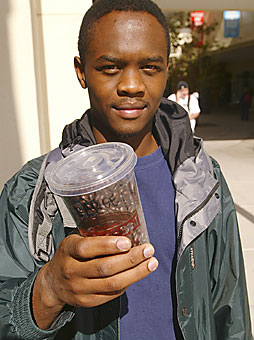 |
|
KEVIN B. KLAUS/Arizona Daily Wildcat
|
Students for Fair Trade President Mosenge "Moses" Nyaribo, an aerospace engineering junior, has been meeting with members of the UA Dining Services in an effort to get the university to serve fair trade-certified coffee.
|
|
|
By Kylee Dawson
Arizona Daily Wildcat
Wednesday, December 1, 2004
Print this
A UA student club might get its wish for the university to serve fair trade-certified coffee sooner than it expected.
Members of Students for Fair Trade are requesting the UA Dining Services provide fair trade coffee, a request dining services representatives are seriously considering upon receiving more information about the coffee from Seattle's Best Coffee, the UA's coffee supplier.
"I think we're going to get a good response," said Victoria Christie, associate director of Dining Services.
Fair trade coffee certification guarantees small-scale coffee farmers more income to feed their families without being exploited by "oft-politician-led companies," according to the Students for Fair Trade Web site.
"Many coffee providers are now serving fair trade coffee, but unless you specifically ask for it, it is kind of hard to tell what coffee you are drinking," said Mosenge "Moses" Nyaribo, an aerospace engineering junior and president of Students for Fair Trade.
The UA will request the fair trade blends if they do not cost more than the standard blend, said David Galbraith, director of Dining Services and associate director of the Student Union.
However, Mark Hazelwood, customer service representative for Seattle's Best Coffee, said between fair trade and standard blends vary only slightly.
Students for Fair Trade members were met with positive discussions during a meeting with dining services representatives, including Christie, Nov. 29.
Like students, professors do not want to pay extra money for their coffee, said Kristi Van Os, an administrative assistant in food services who attended the meeting.
Some fair trade foods, such as bananas, can cost more than non-fair trade items, which is something UA dining services cannot afford to pay, Galbraith said.
With a $35 million annual budget to purchase food items, the University of California in Berkeley can afford to spend the extra money for fair trade items, Galbraith said. But with a $12 million annual budget for food buying, the UA cannot afford to pay the extra costs, Galbraith said.
"We are the smallest food service in the Pac-10 so we really struggle (financially)," he said.
Nyaribo said he founded the Students for Fair Trade this fall semester "to create awareness about conditions of disenfranchised farmers and workers."
Millions of working people worldwide, especially farmers, could be lifted out of poverty if world trade rules were made fair, Nyaribo said.
"Increasingly, global trade rules have been unjust, workers and farmers are mistreated and underpaid as multinational companies take advantage of unproductive legal systems in poor countries to get almost free labor and almost free raw materials," Nyaribo said.
Students for Fair Trade members submitted a fair trade coffee proposal to ASUA president Alistair Chapman, Galbraith, and UA President Peter Likins in mid-November, Nyaribo said.
Nyaribo said he thinks the UA could begin offering fair trade coffee by next spring.
Members of the club started the petition on Nov. 3 and collected more than 900 signatures Nov. 29, Nyaribo said.
Now that the food dining services are "on our side," Hoberg said, they will continue to collect up to 3,000 signatures should Seattle's Best Coffee request proof of the students' demand for fair trade coffee.
The UA is three years into its 10-year contract with Seattle's Best Coffee and Starbucks, Galbrait said.
Instead of ending their agreement with the coffee companies, García said Students for Fair Trade would like the UA to instead request the fair trade blends.
"There's tons of people out there that are willing to take that step," said Robert Hoberg, a pre-business freshman and member to Students for Fair Trade.
"We have been raising awareness about fair trade coffee on campus, and the response from students, staff and faculty has been very positive," Nyaribo said. "It's not been easy coming from zero to where we are."
